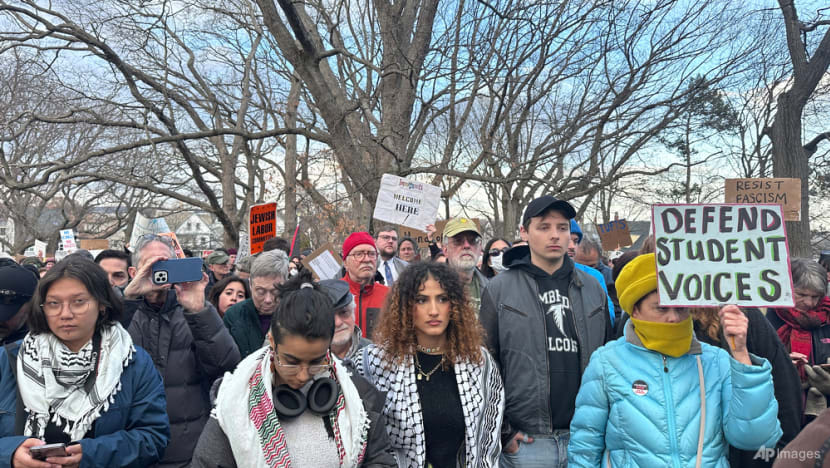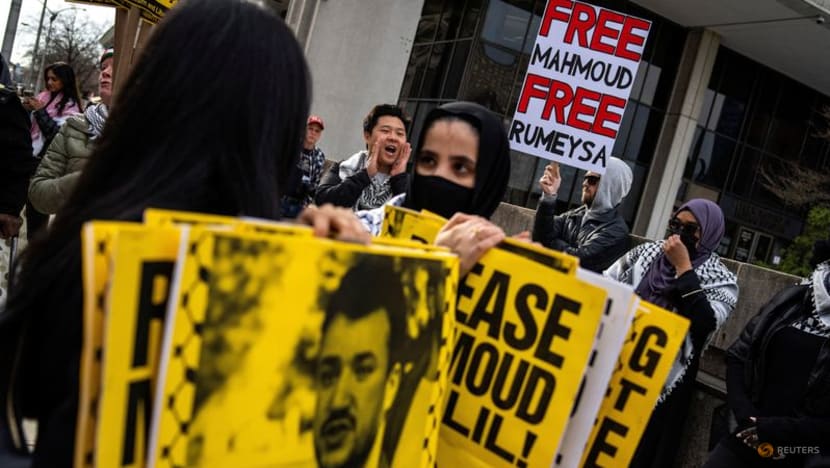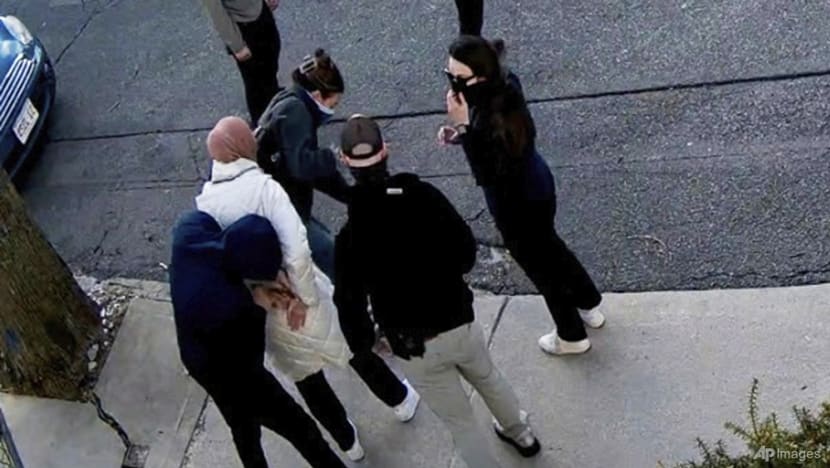Commentary: Should students from Singapore and Asia rethink plans to study in American universities?
As US immigration authorities revoke student visas without full transparency, international students face new uncertainties, says NTU’s Mark Cenite.

Hundreds of people gather in Somerville, Massachusetts, on Mar 26, 2025, to demand the release of Rumeysa Ozturk, a Turkish student at Tufts University who was arrested by federal agents. (AP Photo/Michael Casey)

This audio is generated by an AI tool.
SINGAPORE: Should a student in Singapore accept an admission offer from an American university? What about a short-term exchange opportunity?
As deadlines approach to choose where to study, the Trump administration is cancelling student visas and threatening to deport foreign students.
US Secretary of State Marco Rubio told reporters in late March that he signed the cancellation of 300 visas, some of which were student visas. New reports of student visa cancellations have since emerged from California universities and Harvard University.
The situation is developing rapidly, and without full transparency from US immigration authorities.

WHO THE TARGETED STUDENTS ARE
Some of the students reportedly targeted by the US Immigration and Customs Enforcement participated in pro-Palestinian protests. Among the first detained was Mahmoud Khalil, an Algerian citizen who was a spokesman for an activist group at Columbia University.
Yunseo Chung, a South Korean undergraduate at Columbia, was arrested in connection with a protest, and does not appear to have been a leading activist.
Mr Khalil is a lawful permanent resident of the US, as is Ms Chung, who has lived in the US since the age of seven. Both now face proceedings to reverse that status.
A recent viral video showed plainclothes officers arresting Rumeysa Ozturk, a Turkish doctoral student on a student visa at Tufts University, as she walked along a public street. She co-authored an op-ed in the student newspaper that criticised the university’s response to the war in Gaza, and remains in detention.

NOTHING TO FEAR IF YOU KEEP YOUR HEAD DOWN?
Explaining the rationale for revoking student visas, Mr Rubio said: “I think it’s crazy to invite students into your country that are coming onto your campus and destabilising it.”
“We’re looking every day for these lunatics that are tearing things up,” he added.
Mr Rubio has directed US embassy and consular officials stationed overseas to scrutinise the social media accounts of student visa applicants for criticism of the US.
It’s possible that there’s little for a typical, diligent student to fear when joining the legions of Singaporeans studying at American universities. Perhaps they can carry on as usual, worrying more about a challenging exam than a knock on the door from immigration officials.
However, what’s missing from the Trump administration’s messaging may be revealing.
Mr Rubio’s swagger regarding his role in deporting “lunatics” has not been paired with assurances that law-abiding students who do not disrupt campus life will always be welcome.
This omission may be deliberate. At the core of the Make America Great Again movement is its strict stance on immigration. Even the visas for high-tech talent that have helped Silicon Valley thrive may be in shorter supply.
While foreigners in America have rights to free expression, a visa to enter or stay in the country is more akin to a privilege. Immigration law grants the State Department, which Mr Rubio oversees, broad discretionary authority to revoke visas from anyone deemed a threat.
ESCALATING TENSIONS, SLASHED FUNDING
As the Trump administration escalates global tensions, students from Singapore may also be concerned about how they will be received in America.
A 2020 Washington Post report and a civil rights group’s 2016 survey of educators both linked bullying in schools to Mr Trump’s inflammatory rhetoric, which seems to embolden individuals to harass those viewed as foreign. Vox reported on similar incidents in educational institutions, including colleges, after the 2024 election.
Postgraduate students may find their options evaporate, as research grants are in jeopardy. The Trump administration is reassessing federal funding to top universities such as Columbia and Harvard, which they accuse of prioritising diversity, equity, and inclusion programmes and not acting aggressively enough to curb pro-Palestinian protests in 2024.
Universities across the US are concerned that funding may become contingent on ideology. After years of dubious claims that critical race theory has permeated American education, Mr Trump issued executive orders directing American schools and the Smithsonian Institution to cease depicting America’s history in an unflattering light.
Once-fringe views, such as scepticism about vaccines and climate change, may lead to cuts in related research.
Even research that passes ideological scrutiny may be subject to the sweeping cost-cutting measures of the Department of Government Efficiency, which is eliminating grant programmes at the National Endowment for the Humanities.
AN UNPRECEDENTED OPPORTUNITY FOR INTERNATIONAL STUDENTS
A family whose child dreams of studying in America years later might find solace in the fact that Mr Trump is in his final presidential term, despite his suggestions to the contrary. Immigration policy may return to the status quo that prevailed under previous presidents from both parties.
In the meantime, prospective international students may question whether they are willing to refrain from expressing their views on controversial issues, in exchange for peace of mind while studying in the US.
But studying in America amid this tumult offers unprecedented opportunities. Students who can bridge cultural divides are needed now more than ever, and university campuses often live up to their reputation as islands of openness.
My Nanyang Technological University (NTU) students returning from semester-long exchange programmes almost invariably confirm that their experience of studying abroad was transformative. Often, their transformation corresponds to the degree of challenge.
International students are not the only beneficiaries of time spent overseas. As an American educated in US universities, getting to know a classmate from Russia helped shatter my preconceptions.
A role as an informal ambassador is not within every student’s comfort zone, nor is anyone obligated to fulfil it. Individuals and their families must decide if studying abroad is a fit for them during the Trump era.
The United States may regain its status as a destination for the world’s brightest when the pendulum of American politics swings closer to the centre. Until then, however disheartening it is for many Americans who would gladly welcome them to campus, it’s understandable that many students will forgo opportunities to study there.
Dr Mark Cenite is Associate Dean (Undergraduate Education) at Nanyang Technological University’s College of Humanities, Arts, and Social Sciences, and teaches media law and artificial intelligence law at the Wee Kim Wee School of Communication and Information.


















